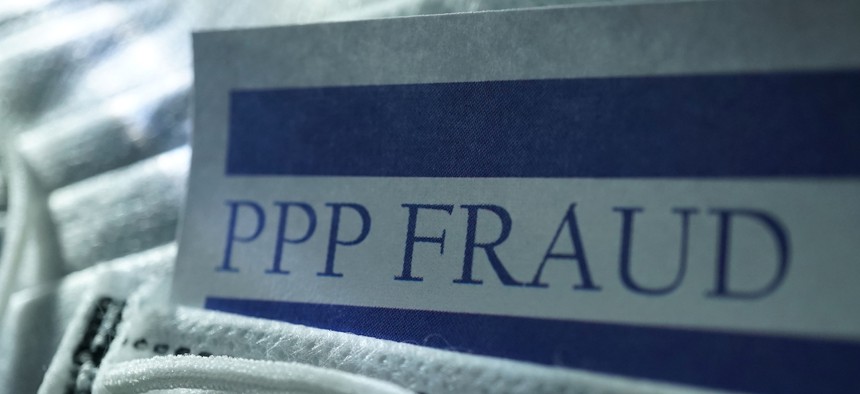
The Small Business Administration estimates the amount of likely fraud at $36 billion. Kameleon007/Getty Images
Stimulus fraud prevention isn’t a lost cause, it’s an opportunity for new tools and techniques
COMMENTARY | The lessons learned – and the data – from Paycheck Protection Program fraud can be used to build better models for sifting through fraud data.
In economic emergencies such as the recent COVID-19 pandemic, there’s a desire and need to release relief money quickly to those who qualify and legitimately need it. Unfortunately, in such situations, criminals also amass at the gate to submit fraudulent claims for themselves. Their techniques are often well coordinated, and sophisticated technology equips them to commit this fraud at a massive scale.
For a sense of how overwhelming these attempted fraud onslaughts can be, the Small Business Administration’s Office of Inspector General received 148,525 hotline complaints related to the The Small Business Administration estimates the amount of likely fraud at $36 billion. as of March 2021. This is a staggering 19,500% increase over previous years.
Some have argued that preventing fraud is not a government priority, with no tangible consequences for agency leaders. But when the criticism mounts high enough, the budget stops flowing. Witness the IRS budget contractions from 2010-2019, during which the tax agency’s workforce was reduced by more than 20,000 employees. These are real consequences.
The Pandemic Response Accountability Committee Task Force oversees pandemic relief spending and coordinates oversight among federal agencies and member OIGs. Its efforts to promote greater coordination and transparency have been well received. To date, the PRAC continues to report successful criminal investigative results fighting fraud related to the almost $5 trillion in pandemic-related programs and spending.
However, the PRAC still has a daunting task ahead. In a June 2023, "Fraud Landscape" report, the SBA’s IG estimated the agency’s potential fraud loss at $200 billion, while the agency puts the amount of likely fraud at $36 billion. Regardless of the amount of actual fraud, there’s more work to be done.
Opportunities Ahead
The many investigative challenges that arose after PPP fraud should be embraced as opportunities to evolve methods and data sharing.
Investigative efforts aided by decision intelligence and data analytics can amplify the efficiency of the great investigative work being done today to prevent, detect, and investigate fraud and help recover lost funds.
In addition to the sheer volume of fraud attempts, agencies face many other challenges, including:
- Detection of fraud attempts before issuance of payments (prevention).
- Volume of successful fraud attempts (strains resources applied to investigations and prosecutions).
- Resources that must be applied to the attempted recovery of funds.
Collaboration and Data Sharing
Much of the PPP fraud that surfaced at the federal level began at the state level via local agencies, and the lack of a universal means of inter-agency communication and information sharing remains a major challenge. Fraudulent PPP loans were often granted to unsuspecting victims of larger organized fraud, and they’re now obligated to pay the money back because they weren’t eligible in the first place. These complaints/leads often flow to the task forces of state-level IG offices.
Multiple hotlines have been established by the PRAC Task Force and others, so depending on the hotline a whistleblower uses, leads may go to an agency that either doesn’t have the resources to pursue the lead or the potential fraud isn’t within their jurisdiction.
In these instances, compelling fraud cases can fall through the cracks; connections between multiple leads might be missed. Conversely, the investigative effort may sometimes be duplicated, with multiple agencies working on the same leads in instances where whistleblowers contacted multiple agencies/hotlines.
If state and local agencies could share access to a centralized electronic platform for all their leads, analytics of ingested data and data intelligence would become more efficient and productive. By fusing and sharing this data, agencies with limited resources could better prioritize their caseload and maximize their investigative ROI. Subsequently, federal agencies could use data analytics and decision intelligence tools to surface meaningful leads from state/local agencies and establish broader criminal patterns that build larger criminal cases. While legal and policy roadblocks can prevent data sharing, continued conversations among agencies are essential to overcome these challenges.
Ingestion of data from leads and investigations into a task force like PRAC from multiple sources can assist with efficient deconfliction and investigative connections that help visualize the fraud network.Moreover, it:
- Helps minimize duplication of effort by multiple agencies working separately on the same case.
- Maximizes existing resources.
- Identifies key trends in fraud attempts to help agencies prevent issuance of future fraudulent payments.
Meanwhile there’s an immediate opportunity to further centralize stimulus fraud data and fight this fraud with decision intelligence and data analytics. With a technological solution that can ingest, analyze, and link structured as well as unstructured data – connecting the dots between criminal activities – there’s a greater opportunity to hold criminals accountable.
It is essential we utilize the lessons learned – and the data – from PPP stimulus fraud, which continues to tap our federal, state, and local resources, to build better models for sifting through fraud data that will serve us well in the future. We’ll be that much better prepared to combat future fraud schemes, regardless of the nature of the stimulus payment or the scheme.
Tracey Montaño is a former IRS criminal investigation senior leader and an industry consultant for Cognyte.






